Current Fellows
Avraz Anwar

B.S. 2019, Middle Tennessee State University, Murfreesboro, TN
M.S.2019, Middle Tennessee State University, Murfreesboro, TN
Discipline: Chemistry
Mentor: Juan Del Valle
Research Project:
Avraz's research focuses on the structure-activity relationship of pseudouridimycin (PUM), a potent bacterial RNA polmerase (RNAP) inhibitor. The objective of his project is to develop a more potent, stable, and selective analog of PUM suitable for in vivostudies against multidrug-resistant bacterial infected organisms.
Internship:
Avraz will join Professor Richard Ebright's lab at Rutgers University from June - August 2024. Avraz's training will focus on completing assays ranging from analysis of RNAP inhibition, in vitro analysis of bacterial growth inhibition, and human cell toxicity which will complement his ability to conduct experiments with both prokaryotic and eukaryotic cell lines.
Honors:
- Welter Family Graduate Fellowship for Research on Cystic Fibrous 2022-2023
Publications:
- Anwar, A.F.; Cain C.F.; Garza M.J.; Degen D.; Ebright R.H.; Del Valle J.R. Stabilizing Pseudouridimycin: Synthesis, RNA Polymerase Inhibitory Activity, and Antibacterial Activity of Dipeptide-Modified AnaloguesStabilizing Pseudouridimycin: Synthesis, RNA Polymerase Inhibitory Activity, and Antibacterial Activity of Dipeptide-Modified Analogues. ChemMedChem. 2023, Sep 26:e202300474. DOI: 10.1002/cmdc.202300474. Online ahead of print. PMID: 37751316
- Elbatrawi, Y.M.; Gerrein, T.; Anwar, A.; Makwana, K.M.; Degen, D.; Ebright, R.H.: Del Valle, J.R. Total Syntheis of PargamicinA. Org Lett. 2022, 24(50):9285-9289. PMID: 36516292. DOI: 10.1021/acs.orglett.2c03861.
William Castillo
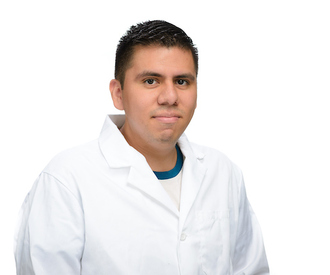
B.S. 2019, CalPoly Humboldt, Arcata, CA
Discipline: Biochemistry
Mentor: Holly Goodson
Research Project:
William's research project focuses on the development of novel methods that are both accurate and cost-effective for the detection of a wide array of bioavailable nutrients that are overly enrichment in freshwater and marine ecosystems(Eutrophication) that has become a worldwide environmental problem.
Internship:
June 12- July 23, 2023. The University of Notre Dame, Notre Dame, IN. Department of Biological Sciences. Mentor: Professor Jennifer Tank. William's Primary Focus was assessing the efficacy of two-stage ditches in mitigating nutrient influx from the tile drain runoff into larger bodies of water. William also worked on two goals during his internship: (1) developing a high level of proficiency in the collection and processing of samples extracted from environmental water sources and (2) becoming an expert in using standard chemical methods to measure Phosphorus. William also learned how to quantify nitrogen and phosphorous levels from various water samples and became an expert in collecting and processing samples obtained from environmental water sources.
Kevin Catalfano
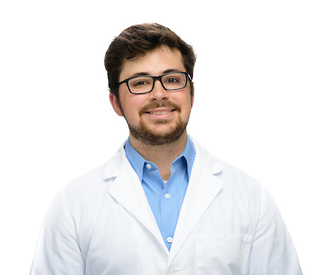
B.S. 2020, Hope College, Holland, MI
Discipline: Biochemistry
Mentor: Brian Blagg
Research Project:
Kevin's research focuses on the development of Aha1/Hsp90 small molecule disruptors for the reduction of tau fibrillization in Alzheimer's disease. This project will integrate organic synthesis, biochemical evaluation, and pharmacological optimization of these derivatives.
Internship:
July 7-August 26, 2023. The University of South Florida. Department of Molecular Medicine. Tampa, FL. Mentor: Professor Laura Blair. At USF, Kevin performed in vivo pharmacokinetic studies using C57BL/6 mice with recently developed molecular disruptors synthesized in the Blagg lab. This study involved intraperitoneal injection, organ harvest and mass spectrometry characterization of compound distribution. Additionally, Kevin performed immunoprecipitation
Publications:
- Keegan, B.; Catalfano,K.; Bannerjee, M.; Blagg, B. Synthesis and evaluation of small molecule disruptors of the Aha1/Hsp90 complex for the reduction of tau aggregation. ACS Medicinal Chemistry Letters. 2022, 13, 827-832. PMID: 35586436, PMCID: PMC9109267 (available on 2023-05-12). DOI: 10.1021/acsmedchemlett.2c00064
-
Lubin, J.H.: Zardecki, C.; Dolan, E.M.; Lu, C.; Shen, Z.; Dutta,S.; Westbrook, J.D.; Hudson, B.P.; Hudson, B.P.; Goodsell, D.S.; Williams, J.K.; Voight, M.; Sarma, V.; Xie,L.; Venkatachalam, T.; Arnold, S.; Alfaro Alvarado, L.H.; Catalfano,K.; et all. Evolution of the SARS-CoV-2 proteome in three dimensions (3D) during the first 6 months of the COVID-19 pandemic. Proteins. 2021, 90,1054-1080. PMID: 34580920, PMCID: PMC8661935, DOI: 10.1002/prot.26250
Jordan Chasteen
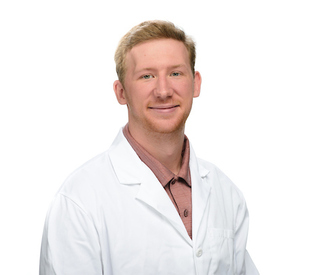
B.S. 2020, Texas Tech University, Lubbock, TX
Discipline: Biochemistry
Mentor: Bradley Smith
Research Project:
Jordan's research project focuses on developing novel technologies and biochemical methods to improve liposome and related nanoparticle drug delivery systems, as well as understanding the underpinnings of lipid membrane dynamics employing various spectroscopic and microscopy techniques. In 2023 he will pursue an internship that will expand his chemical and quantitative biomembrane training, with a technical focus on selective nanoparticle targeting of disease.
Internship:
March 15 - April 15, 2023. Constructor University. Department of Life Sciences and Chemistry. Bremen, Germany. Mentor: Professor Werner Nau. Jordan's internship focused on the development of a supramolecular, fluorescence assay that allows for the study of enzymatic, signal transduction across a model cellular membrane. During his internship, he gained valuable knowledge about the design and optimization of host-guest molecules and the best systems to employ them in. He also learned different strategies for liposome formulation and purification while expanding his understanding of the field of supramolecular, synthetic, fluorescent and analytical chemistry.
Publications:
- Zhang, Z.; Chasteen, J. L.; Smith, B. D. Cy5 Dye Cassettes Exhibit Through-Bond Energy Transfer and Enable Ratiometric Fluorescence Sensing. J. Org. Chem. 2024. https://pubs.acs.org/doi/10.1021/acs.joc.3c02767
- Gamage, R.S.; Chasteen, J.L.; Smith, B.D. Lipophilic Anchors that Embed Bioconjugates in Bilayer Membranes: A Review. Bioconjugate Chemistry 2023, PMID: 37276240. (DOI: 10.1021/acs.bioconjchem.3c00204).
- Chasteen, J.L.; Padilla-Coley, S.; Li, D-H.; Smith, B.D. Palladium responsive liposomes for triggered release of aqueous contents. Bioorg. Med. Chem. Lett. 2023, 84:129215. PMID: 36870622. PMCID: PMC10023436 (available on 2024-03-15)DOI: 10.1016/j.bmcl.2023.129215.
- Shaffer, C.C.; Zhai, C.; Chasteen, J.L.; Orlava, T.; Zhukovskyi, M.; Smith, B.D. Silica nanoparticle remodeling under mild conditions: versatile one step conversion of mesoporous to hollow nanoparticles with simultaneous payload loading. Nanoscale Communication. 2022 (Accepted 17-Nov-2022)
Praise Chukwunalu Chukwuma

B.A. 2021, Wabash College, Crawfordsville, IN
Discipline: IBMS
Mentor: Brian Baker
Research Project:
Praise's research is focused on determining the allospecificity of T cells driving acute cellular rejection and the role T cell- reactivity and viral infections may play in graft rejection. Praise's work also entails understanding the basis of such specificity from a structural prespective; thus, his work will integrate transplantation immunology, biosphysics/structural biology, and analytical chemistry.
Internship:
Praise’s internship will focus on learning to use tandem mass spectrometry to identify viral peptides presented by APCs that induce a T-cell response
Publications:
-
Shi, T.; Burg, A.R.; Caldwell, J.T.; Roskin, K.M.; Castro-Rojas, C.M.; Chukwuma, P.C.; Gray, G.I.; Foote, S.G.; Alonso, J.A.; Cuda, C.M.; Allman, D.A.; Rush, J.S.; Regnier, C.H.; Wieczorek, G.; Alloway, R.R.; Shields, A.R.; Baker, B.M.; Woodle, E.S.; Hildeman, D.A. Single-cell transcriptomic analysis of renal allograft rejection reveals insights into intragraft TCR clonality. J.Clin.Invest. 2023. May25:e170191, Doi: 10.1172/JCI170191. Epub ahead of print. PMID: 37227784.
Amr El-Araby
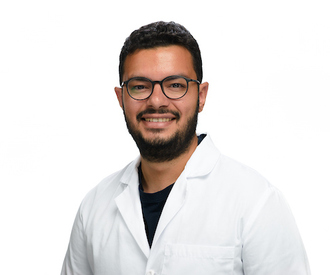
B.Pharm 2017, Ain Shams University, Cairo, Egypt
Discipline: Biochemistry
Mentor: Shahriar Mobashery
Research Project:
Amr's research involves the investigation of the cell-wall recycling pathway in the Gram-negative bacterium Pseudomonas aeruginosa. The focus of this project is to integrate chemical synthesis, biochemical methods, and biophysics to elucidate and characterize the metabolic flux of this pathway and the protein-protein interactions among the pathway enzymes.
Internship:
Amr will be in Shahriar Mobashery’s lab from September – November 2023.
Publications:
- El-Araby, A. M.; Jiménez-Faraco, E.; Feltzer, R.; Martin-Garcia, J.M.; Karri, B.R.; Ramachandran, B.; Kim, C.; Fisher, J.F.; Hermoso, J.A.; Mobashery, S. Catalytic process of anhydro-N-acetylmuramic acid kinase from Pseudomonas aeruginosa. The Journal of Biological Chemistry, 2023, 299 (10):105198. doi: 10.1016/j.jbc.2023.105198. Epub 2023 Sep 1. 105198-105198.
-
El-Araby, A. M.; Feltzer, R.; Kim, C.; Mobashery, S. Application of 2D-ITC to the Elucidation of the enzymatic Mechanism of N-Acetylmuramic Acid/N-Acetylglucosamine Kinase (AmgK) from Pseudomonas aeruginosa. Biochemistry, 2023. 18, 62(8): 1337-1341.. Epub 2023 Mar 27. PMID: 36971350DO DOI: 10.1021/acs.biochem.3c00090
Madeline Glennon
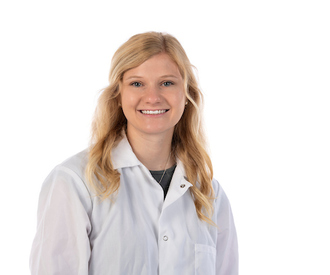
B.A.2018, University of Colorado Boulder, Boulder, CO
M.S. 2020, University of Colorado Denver, Denver, CO
Discipline: Biochemistry
Mentor: Jessica A. Brown
Research Project:
Madeline's research project is focused on the selectivity and binding of small molecules to triple helical RNA and the elucidation of the interaction between small molecules and RNA through a high-resolution structure.
Internship:
April 30, 2022 - July 24, 2022. The Ohio State University, Department of Biological Chemistry and Pharmacology, Columbus, OH. Mentor: Professor Charles Bell. Madeline's internship involved screening cryo-TEM grids of the MALAT1 triple-helical RNA in complex with TBMs as well as the apo form of the triple-helical RNA. The internship helped to expand her knowledge on the physical chemistry involved in RNA-small molecule complex validation via cryo-TEM and computational analysis of the 3D structure of the MALAT1 triple-helix structure.
Honors:
- 2023 CrystEng Comm Poster Prize ACA Conference
- Two-year American Heart Association Predoctoral Fellowship 2023-2025
Andrew Gutierrez
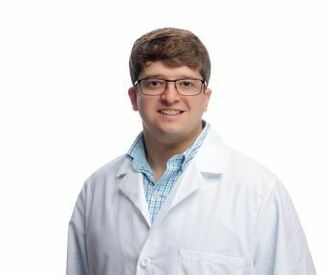
PharmD2021, Butler University, Indianapolis, IN
Discipline: IBMS
Mentor: Brian Blagg
Research Project: Andrew's research revolves around the creation of small molecule inhibitors of TRAP1, the mitochondrial Hsp90isoform, for the treatment of cancer and diabetic retinopathy. His research involves organic synthesis, biological evaluation, and improving the drug-like properties of these molecules.
Internship: Andrew will join Professor Timothy Corson's lab at Indiana University School of Medicine from May - July 2024. Andrew's training will focus on utilizing techniques to investigate the impact of TRAP1 inhibition on diabetic retinopathy.
Publications:
- Merfeld, T.; Peng, S.; Keegan, B.M.; Crowley, V.M.; Brackett, C.M.; Gutierrez, A.; McCann, N.R.; Reynolds, T.S.; Rhodes, M.C.; Byrd, K.M.; Deng, J.; Matts, R.; Blagg, B.S.J. Elucidation of novel TRAP1-Selective inhibitors that regulate mitochondrial processes. Eur J Med Chem. 2023, 258:115531. PMID: 37307624. DOI: 10.1016/j.ejmech.2023.
115531 . - Weig, A.W.; O’Connor, P.M.; Kwiecinski, J.M.; Marciano, O.M.; Nunag, A.; Gutierrez, A.T.; Melander, R.J.; Horswill, A.R.; Melander, C. A structure activity relationship study of 3,4'-dimethoxyflavone for ArlRS inhibition in Staphylococcus aureus. Org Biomol Chem. 2023, 21(16):3373-3380. PMID: 37013457. PMCID: PMC10192164 (available on 2024-04-26). DOI: 10.1039/d3ob00123g.
Guoqiang Liu

B.S. 2017, Tsinghua University, Beijing, China
Discipline: Biology
Mentor: Xin Lu
Research Project:
Guoqiang's research project involves research on protein nitration and other mechanisms that MDSCs (myeloid-derived suppressor cells) contribute to the immunosuppressive tumor microenvironment. He is also working on developing MDSC-targeted delivery strategy for tumor diagnosis and combinatorial immunotherapy.
Internship:
Guoqiang is planning to take an internship in the School of Life Science at Westlake University in Summer 2021 and work with Dr. Feng Shan on proteomic screening of MDSCs and T cells in tumor microenvironment.
Publications:
- Luo, Y.; Medina Bengtsson, L.; Wang, X.; Huang, T.; Liu, G.; Murphy, S.; Wang, C.; Koren, J. 3rd; Schafer, Z.; Lu, X. UQCRH Downregulation Promotes Warburg Effect in Renal Cell Carcinoma. Sci Rep. 2020,10(1):15 021. doi: 10.1038s41598-020-72107-2. PMID: 32929120. PMCID: PMC749063.
- Liu, G.; Jin, Z.; Lu, X. Differential Targeting of Gr-MDSCs, T Cells and Prostate Cancer Cells by Dactolisib and Dasatinib. Intl J Mol Sci, 2020, 21(7):2337. doi: 10.3390/ijms21072337. PMID: 32230980. PMCID: PMC7178187.
- Zhang, Y.; Liu, G.; Sun, M.; Lu, X. Targeting and Exploiting Tumor-associated Neutrophils to Enhance Immunotherapy and Drug Delivery for Cancer Treatment. Cancer Biol Med, 2020, 17(1):32-43. doi: 10.20892/j.issn.2095-3941.2019.0372 PMID: 32296575. PMCID: PMC7142839.
Taylor Lundgren

B.S. 2019, Brigham Young University, Provo, UT
Discipline: Biochemistry
Mentor: Matthew Champion and Patricia Clark
Research Project:
Taylor's research project's primary focus is in developing nascent chain proteomics, where unique biochemical methods are used to label and purify peptides during translation. Comparing nascent and mature peptides enables more accurate quantification of mistranslation rates and could provide novel insight into the effect on the translation by differential codon usage.
Internship:
Taylor is planning an internship at John Hopkins University, Baltimore, MD with Dr. Allan Buskirk as his mentor. Dr. Buskirk's work utilizes ribosomal profiling to characterize the interactions between ribosomes, mRNA, and the nascent polypeptide during translation in bacteria, with emphasis on the cause and effect of ribosomal pausing.
Hannah Marietta

Ansley Nemeth
B.S. 2018, Winthrop University, Rock Hill, SC.
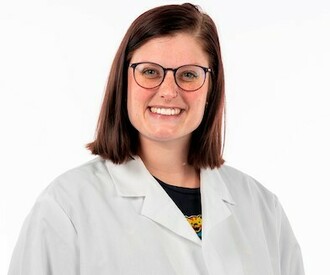
Discipline: Chemistry
Mentor: Christian Melander
Research Project:
Ansley's research project involves the synthesis of small molecules that will be biologically evaluated for their use as antibiotic adjuvants. These molecules are tested using microbiological techniques to determine their activity in combination with different antibiotics against Gram-negative pathogens such as Acinetobacter baumannii and; Klebsiella pneumoniae.
Internship:
June 15, 2021- July 20, 2021. Northeastern University, Boston, MA. Mentor: Professor, Edward Geisinger, Department of Biology. Ansley's internship will entail significant training in biological-related disciplines, in particular, genetic and molecular biology. She will learn how to carry out transposon sequencing (Tn-seq) analysis. The Tn-seq method will allow the determination of the specific genetic pathways that novel small molecule adjuvants are affecting.
Honors:
- American Chemical Society MEDI Predoctoral Fellowship 2021-2022
Publications:
- Marrujo, S.A.; Hubble, V.B.; Yang, J.; Wang, M.; Nemeth, A. M.; Barlock, S.L.; Juarez, D.; Smith, R.D., Melander, R.J; Ernst, R.K. Chang, M.; Melander, C.C. Dimeric 2-aminoimidazoles are highly active adjuvants for Gram-positive selective antiobiotics against Acinetobacter baumannii. European Jornal of Medicianal Chemistry, 2023 (submitted).
- Hubble, V.B.; Bartholomew, K.R.; Weig, A.W.; Brackett, S.M.; Barlock, S.L.; Mattingly, A.E.; Nemeth, A.M.; Melander, R.J.; Melander, C. Augmenting the Activity of Macrolide Adjuvants Against Acinetobacter Baumannii. ACS Med Chem Lett. 2020, 11(9):1723-1731. doi: 10.1021/acsmedchemlett.0c00276.eCollection 2020 Sep 10. PMID: 32944140. PMCID: PMC7488284 (available on 2021-09-10).
- Nemeth, A. M.; Basak, A. K.; Weig, A. W.; Marrujo, S. A.; Barker, W. T.; Jania, L. A.; Hendricks, T. A.; Sullivan, A. E.; O’Connor, P. M.; Melander, R. J.; Koller, B. H.; Melander,C. Structure-Function Studies on IMD-0354 Identifies Highly Active Colistin Adjuvants. ChemMedChem, 2020, 15, 210-218. PMID: 31756025, PMCID: PMC69825450(available on 1/17/2021. Doi:10.1002/cmdc.201900560.
-
Barker, W. T.; Nemeth, A. M.; Brackett, S. M.; Basak, A. K.; Chandler, C. E.; Jania, L.A.; Zuercher, W. J.; Melander, R. J.; Koller, B. H.; Ernst, R. K.; Melander, C. Repurposing Eukaryotic Kinase Inhibitors as Colistin Adjuvants in Gram-negative Bacteria. ACS Infectious Diseases, 2019, 5, (10), 1764-1771. doi.org/10.1021/acsinfecdis.9b00212 Epub 2019 Sep 4. PMID: 31434474 PMCID: PMC6944324(available on 2020-10-11).
Tyelor Reynolds
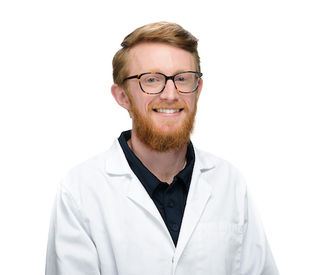
B.S. 2020, Oregon State University, Corvallis, OR
Discipline: Biochemistry
Mentor: Brian Blagg
Research Project:
Tyelor's research is focused on the development of a selective inhibitor for extracellular Hsp90α (eHsp90α), to investigate eHsp90α’s multifaceted role in cancer progression and metastasis. He will perform organic synthesis to access targeted inhibitors and use in-vitro and cell-based assays to characterize the effects of eHsp90α inhibition. As eHsp90α is a clinically relevant drug target, he will examine eHsp90α's regulation of MMP-2 and cell-signaling receptors (e.g. HER2, TGFβR) and use bottom-up proteomics to probe for eHsp90α-dependent processes that may provide insight into how eHsp90α exhibits tumorigenic cellular effects and improved anti-cancer therapeutic strategies.
Internship:
November 9, 2023- January 22, 2024. Keck School of Medicine at the University of Southern California, Department of Dermatology, Los Angeles, CA. Mentor: Professor Wei Li. Tyelor's internship focused on assessing whether cell-impermeable Hsp90α-selective inhibitors can replicate the same anti-cancer and anti-fibrotic effects as the Li Lab's Hsp90α antibody. One of the assays Tyelor learned was how to perform a colloidal gold cell migration assay. His experiments in the Li lab confirmed that his compound can replicate the results previously found with an antibody targeting eHsp90α.
Publications:
- Merfeld, T.; Keegan, B. M.; Crowley, V. M.; Brackett, C. M.; Gutierrez, A. T.; McCann, N. R.; Reynolds, T. S.; Rhodes, M. C.; Byrd, K. M.; Peng, S.; Deng, J.; Matts, R. L.; Blagg, B. S. Elucidation of Novel TRAP1-Selective Inhibitors That Regulate Mitochondrial Processes. Eur. J. Med. Chem. 2023, 258, 115531. PMID: 37307624. DOI: 10.1016/j.ejmech.2023.
115531 . - Reynolds, T.S.; Blagg, B.S. Synthesis and Validation of the First Cell-Impermeable Hsp90α-Selective Inhibitors. ACS Med. Chem. Lett. 2023, 14, 9, 1250–1256.
- Merfeld, T.; Peng, S.; Keegan, B.M. (co-first author); Crowley, V.M.; Brackett, C.M.; McCann, N.R.; Reynolds, T.S., Rhodes, M.C.; Byrd, K.M.; Deng, J.; Matts, R.L.; Blagg, B.S.J. Elucidation of novel TRAP1-selective inhibitors that directly regulate mitochondrial processes with molecular precision, Nature Communications. 2022. submitted.
Syrah Starnes
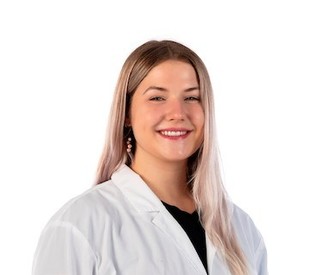
B.A. 2020, Lewis & Clark College, Portland, OR
Discipline: Chemistry
Mentor: Juan Del Valle
Research Project:
Syrah’s research focuses on developing accessible synthetic routes to soluble and stable beta-sheet mimics. They also utilize structure-based design to synthesize and evaluate novel tau peptidomimetic compounds to inhibit amyloidogenic tau aggregation underlying various neurodegenerative disorders.
Internship:
April 30 - May 28, 2022. Indiana University School of Medicine. Department of Pathology, Indianapolis, IN. Mentors: Doctors Ruben Vidal & Bernardino Ghetti. Syrah’s internship focused on the neuropathology that underlies neurodegenerative tauopathies. She learned how to extract and purify tau disease fibrils from patient brain tissue to be used for her in vitro assays. She also worked directly with different murine lines from extracting primary neuronal cells to initiating neurodegenerative pathology in wild-type mice.
Simon Weaver

Simon's project focuses on the identification and characterization of small proteins(sProts) in mycobacteria. These proteins are important in gene regulation and virulence but are often missed in standard proteomics because of their size and non-canonical sequence characteristics. Simon plans to use an informatics approach to develop algorithms that accurately identify and quantify these sProts using bottom-up proteomics. He is also developing an application for the advanced visualization of quantitative proteomics data.
- Lucy Family Institute for Data & Society Scholar 2023-2025
- Berry Family Foundation Fellowship 2023-2024
- Wang, C.W.; Weaver, S.D.; Boonpattrawong, N.; Schuster-Little, N.; Pantakar, M.S.; Whelan, R.J. “A revised molecular model of ovarian cancer biomarker CA125 (MUC16) enabled by long-read sequencing” 2023 Under Review
- Collars, O.A.; Jones, B.S.; Hu, D.D.; Weaver, S.D.; Sherman, T.A.; Champion, M.M.; Champion, P.A. "An N-acetyltransferase required for ESAT-6 N-terminal acetylation and virulence in Mycobacterium marinum" mBio., 2023. https://doi.org/10.1128/mbio.
00987-23 - Weaver, S.D.; DeRosa, C.M.; Schultz, S.R.; Champion, M.M. "PrIntMap-R: an online application for intra-protein intensity and peptide visualization in bottom-up proteomics” Journal of Proteome Research. 2023, 22 (2), 432–441. DOI: 10.1021/acs.jproteome.2c00606
- DeRosa, C.M.; Weaver, S.D.; Wang, C.W.; Schuster-Little, N.; Whelan, R.J. “Simultaneous N-deglycosylation and digestion of complex samples on S-Traps enables efficient glycosite hypothesis generation” ACS Omega. 2023, 8 (4), 4410-4418. DOI: 10.1021/acsomega.2c08071
- Weaver, S.D.; Ambrose, G.A.; Whelan, R.J. Activity: teaching coding in R through discipline-focused problem-solving in an analytical chemistry course. Journal of Chemical Education. 2022, 99, 3068-3073. DOI: 10.1021/acs.jchemed.2c00395.
- Weaver, S.D.; Schuster-Little, N.; Whelan, R.J. Preparative capillary electrophoresis (CE) fractionation of protein digests improves protein and peptide identification in bottom-up proteomics. Analytical Methods. 2022, 14, 1103-1110. DOI: 10.1039/D1AY02145A.
- Weaver, S.D.; Whelan, R.J. Characterization of DNA aptamer-protein binding Using fluorescence anisotropy assays in low-volume, high-efficiency plates. Analytical Methods. 2021, 13, 1302-1307. PMID: 33533761.
Jingdong Yang
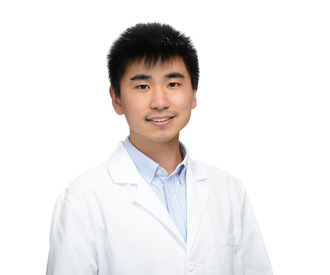
B.S. 2020, Wuhan University, Wuhan, China
Discipline: Biochemistry
Mentors: Mayland Chang and Shahriar Mobashery
Research Project:
Jingdong’s research project focuses on evaluating and characterizing 1, 2, 4-oxadiazoles designed to inhibit the germination of Clostridioides difficile spores. He plans to clarify the structure-activity-
Internship:
September 4 - November 30, 2023. Instituto de Química-Física Rocasolano, Department of Crystallography, Madrid, Spain. Mentor: Professor Juan A. Hermoso Domínguez. Jingdong's research focused on crystalizing oxadiazoles with targeted proteins to elucidate the structural mechanism of spore germination inhibition.
Publications:
- Marrujo, S.A.; Hubble, V.B.; Yang, J.; Wang, M.; Nemeth, A. M.; Barlock, S.L.; Juarez, D.; Smith, R.D., Melander, R.J; Ernst, R.K. Chang, M.; Melander, C.C. Dimeric 2-aminoimidazoles are highly active adjuvants for Gram-positive selective antibiotics against Acinetobacter baumannii. Eur. J. Med. Chem. 2023, 253, 115329, https://doi.org/10.1016/j.ejmech.2023.115329.
- Janardhanan, J.; Kim, C.; Qian, Y.; Yang, J.; Meisel, J.E.; Ding, D.; Speri, E.; Schroeder, V.A.; Wolter, W.R.; Oliver, A.G.; Mobashery, S.; Chang, M. A dual-action antibiotic that kills Cloistridiodes difficile vegetative cells and inhibits spore germination. Proc Natl Acad Sci. 2023, 120(20):e2304110120. doi: 10.1073/pnas.2304110120 PMID: 37155891, PMCID: PMC10193298.
- Qian, Y.; Birhanu, B.T.; Yang, J.; Ding, D.; Janardhanan, J.; Mobashery, S.; Chang, M.* A potent and narrow-spectrum antibacterial against Clostridiodes difficile infection. J.Med.Chem. 2023, https://doi.org/10.1021/1cs.
jmedchem.3c01249 . (ACS Editor’s Choice Article)
